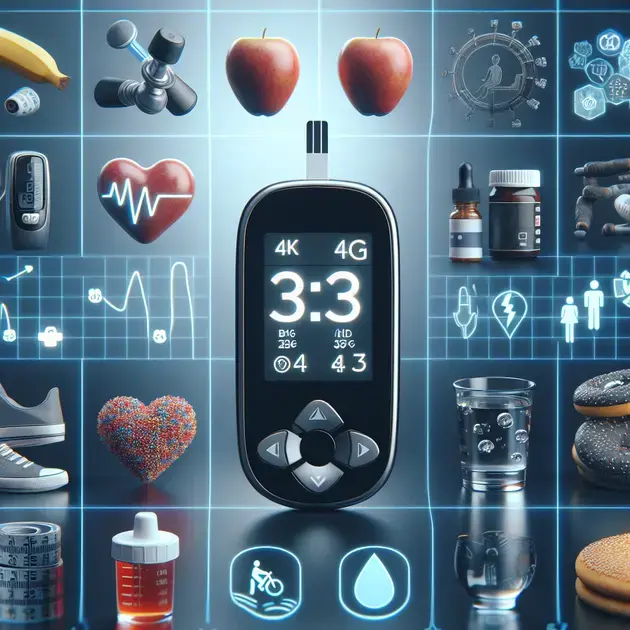When it comes to managing diabetes, understanding your blood glucose results is essential. In this comprehensive guide, we will cover everything you need to know about interpreting and monitoring your blood glucose levels.
Recent studies have shown that having a clear understanding of your blood glucose results can significantly impact your overall health and well-being. By monitoring these levels regularly, individuals can make informed decisions about their diet, exercise, and medication regimen, leading to better diabetes management.
Interpreting Your Blood Glucose Levels
Interpreting your blood glucose levels is crucial for managing diabetes effectively. One of the most commonly used tools to monitor blood glucose is a glucometer. This device measures the amount of glucose in a small drop of blood obtained by pricking the skin. You can easily interpret your blood glucose levels by comparing them to the target range recommended by healthcare professionals. For example, the American Diabetes Association suggests a target range of 80-130 mg/dL before meals.
To interpret your blood glucose levels accurately, it’s essential to understand the meaning of terms like fasting blood sugar, postprandial blood sugar, and HbA1c. Fasting blood sugar refers to the glucose level after fasting for at least 8 hours, typically measured in the morning. Postprandial blood sugar, on the other hand, is the glucose level 2 hours after a meal. HbA1c provides an average of your blood sugar levels over the past 2-3 months.
There are various apps available that can help you track and interpret your blood glucose levels. One popular option is the “MySugr” app, which allows users to log their blood sugar readings, meals, and physical activity. The app provides personalized insights and feedback to help you make informed decisions about your diabetes management.
When interpreting your blood glucose levels, it’s important to consider factors that can affect the readings, such as exercise, stress, illness, and medication. By keeping a detailed log of your blood sugar levels and lifestyle factors, you can identify patterns and make adjustments to your diabetes management plan accordingly.
Remember to consult with your healthcare provider if you have any concerns about your blood glucose levels or if you need help interpreting the results. They can provide guidance on how to make the necessary adjustments to keep your blood sugar levels within the target range for better diabetes management.
The Importance of Monitoring Regularly
Monitoring your blood glucose levels regularly is essential for effectively managing diabetes and preventing complications. By tracking your blood sugar levels throughout the day, you can make informed decisions about your diet, medication, and lifestyle habits. Consistent monitoring allows you to identify trends and patterns in your blood sugar levels, enabling you to adjust your treatment plan accordingly.
One practical way to monitor your blood glucose levels regularly is to use a continuous glucose monitor (CGM). This device provides real-time data on your blood sugar levels, helping you understand how food, exercise, and other factors impact your glucose levels. The information from a CGM can be easily accessed through a smartphone app like “Dexcom G6,” which displays trends, alerts for high or low glucose levels, and historical data for analysis.
In addition to using a CGM, self-monitoring with a glucometer is recommended for daily blood sugar checks. Regular monitoring before and after meals, as well as at bedtime, can provide valuable insights into your glucose control. There are user-friendly glucometer apps like “One Drop” that sync with your device to store and analyze your blood sugar data conveniently.
Regular monitoring not only helps you stay on top of your diabetes management but also empowers you to have meaningful discussions with your healthcare team. By sharing your blood glucose data with your healthcare provider, you can work together to make adjustments to your treatment plan and set achievable goals for better blood sugar control.
Remember that monitoring regularly is not just about numbers; it’s about understanding how your body responds to different factors and taking proactive steps to maintain optimal health and well-being.
Making Informed Decisions for Better Management
Making informed decisions about your diabetes management is key to achieving long-term health and well-being. With the wealth of information available today, it’s crucial to rely on evidence-based resources and expert guidance to make the best choices for your health. When it comes to managing blood glucose levels, knowledge is power.
One way to make informed decisions is to stay informed about current guidelines and recommendations for diabetes management. Websites like the American Diabetes Association (ADA) and the Centers for Disease Control and Prevention (CDC) offer up-to-date information on diabetes care, including diet, exercise, medication, and monitoring.
Utilizing diabetes management apps like “MyFitnessPal” can also help you make informed decisions about your diet and nutrition. By tracking your food intake, you can better understand how different foods affect your blood sugar levels and make adjustments to your eating habits accordingly. These apps often provide personalized recommendations based on your health goals and preferences.
Another aspect of making informed decisions is staying connected with your healthcare team. Regularly scheduled appointments with your doctor, endocrinologist, and other healthcare providers are essential for monitoring your progress, addressing concerns, and adjusting your treatment plan as needed. Telehealth platforms like “Teladoc” have made it easier than ever to communicate with healthcare professionals from the comfort of your home.
Remember that every decision you make about your diabetes management can have a significant impact on your health outcomes. By arming yourself with knowledge, leveraging technology, and collaborating with your healthcare team, you can make informed decisions that set you on the path to better blood glucose control and overall well-being.
**
Understanding Your Blood Glucose Numbers
**
Blood glucose numbers, also known as blood sugar levels, are crucial for overall health. Understanding these numbers and what they mean can help individuals manage conditions such as diabetes effectively. Monitoring blood glucose numbers involves regular testing, either through a glucose meter or lab tests. The results provide valuable insights into how the body processes sugar and insulin. For individuals with diabetes, keeping blood glucose numbers within a target range is essential for preventing complications.
When analyzing blood glucose numbers, it is important to consider factors such as fasting levels, postprandial (after-meal) levels, and HbA1c levels. Fasting blood sugar levels are typically measured in the morning after a period of fasting. Postprandial levels are taken one to two hours after a meal, indicating how the body responds to food. HbA1c levels show average blood sugar levels over the past two to three months, providing a comprehensive view of long-term glucose control.
Individuals can incorporate lifestyle changes to improve blood glucose numbers. These changes may include following a balanced diet rich in fruits, vegetables, whole grains, and lean proteins. Regular physical activity can also help lower blood sugar levels and improve insulin sensitivity. Additionally, monitoring stress levels and getting an adequate amount of sleep are essential for overall glucose management.
By understanding their blood glucose numbers, individuals can make informed decisions about their health. Consulting healthcare providers for personalized guidance and treatment plans based on these numbers is key to effectively managing conditions such as diabetes. With the right knowledge and support, individuals can take control of their blood sugar levels and lead healthier lives.
**
Incorporating Lifestyle Changes for Healthier Results
**
When aiming to improve blood glucose numbers, incorporating lifestyle changes can yield significant results. Making dietary adjustments, such as reducing sugar and refined carbohydrates intake, can help stabilize blood sugar levels. Including fiber-rich foods and healthy fats in meals can slow down the absorption of sugar and promote better glucose control. Portion control and meal timing are also crucial factors in maintaining balanced blood sugar levels.
Regular physical activity plays a vital role in managing blood glucose numbers. Exercise helps the body use glucose for energy, reducing blood sugar levels in the process. Both aerobic activities and strength training can benefit overall glucose metabolism. Incorporating daily movement into the routine, such as walking, cycling, or yoga, can contribute to better blood sugar management.
Managing stress levels is essential for healthier blood glucose results. High stress levels can lead to spikes in blood sugar, affecting overall control. Practicing relaxation techniques, such as meditation, deep breathing exercises, or mindfulness, can help lower stress levels and improve glucose regulation. Adequate sleep is also crucial, as sleep deprivation can impact insulin sensitivity and glucose metabolism.
By incorporating these lifestyle changes, individuals can see positive outcomes in their blood glucose numbers. Consistency in implementing healthy habits and monitoring progress can lead to long-term improvements in glucose control. Consulting with healthcare professionals for tailored advice and support can further enhance the effectiveness of lifestyle changes in achieving healthier blood sugar results.
**
Effective Strategies for Maintaining Stable Blood Sugar
**
Maintaining stable blood sugar levels is a key component of overall health and well-being. Effective strategies for achieving this goal include proper meal planning and timing. Eating regular, balanced meals throughout the day can prevent blood sugar fluctuations and provide a steady source of energy. Incorporating snacks between meals can also help maintain stable glucose levels.
Monitoring carbohydrate intake is essential for managing blood sugar. Choosing complex carbohydrates that are high in fiber, such as whole grains, legumes, and vegetables, can prevent rapid spikes in blood glucose. Balancing carbohydrates with protein and healthy fats in meals can further aid in stabilizing blood sugar levels. Keeping track of food choices and their effects on blood sugar can help individuals make informed decisions for better glucose control.
Hydration plays a significant role in blood sugar regulation. Drinking an adequate amount of water throughout the day can help prevent dehydration, which may affect blood sugar levels. Limiting sugary beverages and opting for water or unsweetened drinks can support stable glucose levels. Additionally, avoiding excessive alcohol consumption is important, as alcohol can impact blood sugar regulation.
Regular monitoring of blood glucose numbers is crucial for understanding how the body responds to various factors. Keeping a log of blood sugar measurements, along with lifestyle habits and food choices, can provide valuable insights into patterns and trends. Adjusting strategies based on this information can help individuals maintain stable blood sugar levels and support overall health and well-being.
**
Conclusion
**
Understanding blood glucose numbers is essential for managing conditions like diabetes effectively. Regular monitoring through glucose meters or lab tests provides insights into how the body processes sugar and insulin, crucial for keeping blood glucose within a target range to prevent complications.
Incorporating lifestyle changes, such as a balanced diet rich in fruits, vegetables, and lean proteins, along with regular physical activity, can help improve blood glucose numbers. Managing stress levels, ensuring adequate sleep, and consulting healthcare providers for personalized guidance are key steps in taking control of blood sugar levels for a healthier life.
Effective strategies like proper meal planning, monitoring carbohydrate intake, staying hydrated, and regular blood glucose monitoring play vital roles in maintaining stable blood sugar levels. By implementing these lifestyle changes and making informed decisions based on monitoring and support, individuals can achieve long-term improvements in glucose control and overall well-being.

